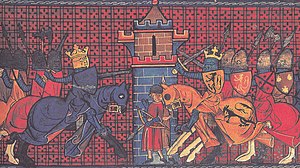User:AngevinKnight1154/Anglo-French War (1194–1199)
| This is not a Wikipedia article: It is an individual user's work-in-progress page, and may be incomplete and/or unreliable. For guidance on developing this draft, see Wikipedia:So you made a userspace draft. Find sources: Google (books · news · scholar · free images · WP refs) · FENS · JSTOR · TWL |
The Anglo-French War (1194–1199) refers to a series of military encounters between Richard the Lionheart of England, and Philip Augustus of France over Richard's possessions in France during the ongoing Capetian-Plantagenet rivalry. The war would see some of the first battles between the two country's heads of state in person after around 50 years of frequent campaigns and raids between the kingdoms during the rivalry.
| Anglo-French War (1194–1199) | |||||||
|---|---|---|---|---|---|---|---|
 The Battle of Gisors, 1198, between Philip II August (left) and Richard Lionheart (right). | |||||||
| |||||||
| Belligerents | |||||||
|
| |||||||
| Commanders and leaders | |||||||
|
|
| ||||||
| Strength | |||||||
| French army under Philip | English army under Richard | ||||||
| Casualties and losses | |||||||
| unknown | unknown | ||||||
Origins
[edit]
The origins of the conflict can be traced to the rise of the Angevin Empire which was brought about by a marriage between Henry II of England, Richard's father, and Eleanor of Aquitaine, which thus united the kingdom of England, and over half of France. Henry sought stability within his new continental possessions by invading neighboring vassals of the French crown, but often went against the will of king Louis VI of France who was the overlord of Henry in his French possessions. Wars between the two kings ensued which involved campaigns and sieges on both sides, but was frequently ended by representatives of the Pope. In 1180, Philip, son of Louis, inherited the Kingdom of France and its rivalry with England, and thus he sought to use Henry's own sons against him to destabilize the realm. Three of Henry's sons, John, Richard, and Henry, were convinced by Philip to rebel against their father and thus began a civil war. In this war, Richard gained the name "the Lionheart" or "Cœur de Lion" in French for his courage in war. The war was brought to a steady end as Henry, Richard, and Philip desired to on Crusade. Henry died in 1189 before he was able to leave for the Holy Land, leaving Richard to inherit the throne. Richard was crowned on 3 September of the same year and immediately embarked on the Third Crusade alongside Philip. Philip, however, returned early from the crusade after arguing with Richard over the acquisition of Cyprus by the crusaders. Upon returning to France, Philip took advantage of Richard's absence, mustered an army, and headed towards Normandy.
Philip's invasion of Normandy
[edit]Battle of Fréteval
[edit]Battle of Gisors
[edit]End of the war
[edit]Aftermath
[edit]References
[edit]External links
[edit]- The Annals of Roger of Hoveden (London, 1853), Henry T. Riley. Roger quotes at length a report from Richard to the Bishop of Durham

